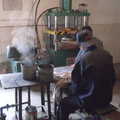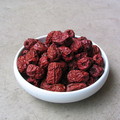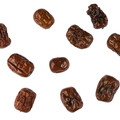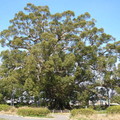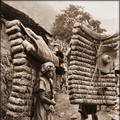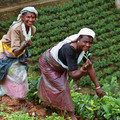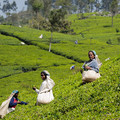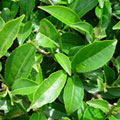Learning how to identify gu shu & make maocha - The Tea Urchin
„The terms "Xiao shu" (small tree) and "tai di" (terrace plantation) are often interchangeably used, but they should be given separate meanings. "Tai di" connotes high intensity farming, with the entire slope cleared & terraced to plant hedgerows & use of pesticide & fertilizer. But in many gu shu growing villages, there are also new tea plantations which are too young to be called gu shu (ie. less than 100 years old), but they aren't exactly "tai di" either. Many of these plants are growing next to old trees, in a bio-diverse forest clearing, with lots of space around them, not all are sprayed & fertilized. In the future, they will grow into "gu shu", until then we should call them "shen tai xiao shu" (naturally grown small trees)“
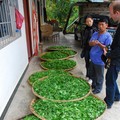
Quotes Tags: Pu-erh, Gushu, Tea production
- Discussion: 0 comments
- Write a comment
Teas - Pu-erh
2006 Ye Sheng Qiao Mu Zhuan Cha Raw 250g
 0 reviews
0 reviewsThe Menglong TF made this 250g tea brick from ancient wild tea tree material in 2006....
968 *Yunnan Haiwan Pu-erh Tea Old Comrade
 0 reviews
0 reviews2008yr 968 *Yunnan Haiwan Pu-erh Tea Old Comrade LaoTongZhi * Pu erh Tuocha Ripe /Shu...
2015 Chawangpu Mengsong Old Tree Xiao
 1 review
1 reviewThis tea come from Mengsong mountain, wild arbor tea garden. Trees are 80-120 years...
2005 Nan Nuo Shan Raw Chi Tse Bing Cha
 1 review
1 reviewThis is a classic and old style cake from Nannuoshan Tea Factory which was renamed as...
2005 Boyou TF 0508M Ripe Puerh Cake
 1 review
1 reviewBoyou was founded in 2005, now is one of the factories which still adhere to the...
2012 Yunnan Sourcing "Qiu Yun" Wild Arbor
 1 review
1 reviewLate autumn harvest tea from wild arbor tea trees (between 60 and 80 year old) growing...
Quotes - Pu-erh
„da piao; 大票 - large ticket. The bigger loose label or ticket which is found inside a tea cake wrapper “
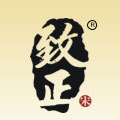
Quotes Tags: China, Pu-erh, Tea production
Video - Pu-erh
Theme
Teas
2007 Boyou "Man Lu Da Shan" Meng Song
 2 reviews
2 reviewsBoyou tea factory was started by yet another ex-Menghai tea blender. Boyou is well known for showcasing...
2013 Chawangpu Xiao Jin Bing Red Tea 100g
 1 review
1 reviewThis small red tea cake is made from 2012 spring harvest Simao high mountain material. Carefully pressing...
Sencha Ohira 2012
 1 review
1 reviewTea is an originally packaged in Japan and stored at low temperatures in Slovakia, which guarantees...
Tea by region
We will help you with tea selection.
Do you like quality loose tea?
We will help you to find the right one for you. Be inspired by tea ratings of other tea lovers. Rating stars could help you.


Review your cup of tea.
Review the tea you are drinking and help other tea lovers to find the right cup of tea.






 Shops
Shops Share on Facebook
Share on Facebook






